Michigan Ross MSCM Students Reach Finals in ISM Global Case Competition
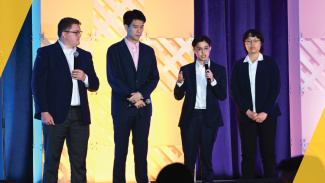
This spring, the Ross School of Business sent a team of four Master of Supply Chain Management students to Las Vegas, Nevada, to compete as finalists in the Institute for Supply Management’s Global Case Competition.
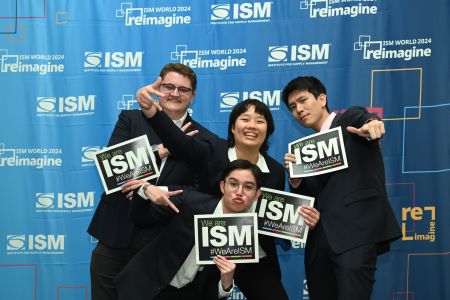 The ISM Global Case Competition draws students from the best supply chain management schools worldwide to work in teams and solve a challenge outlined in a case study. Student teams must develop a solution to a real industry problem and present their findings to supply chain professionals. The four top teams are then selected to compete as finalists in person at ISM’s World Conference in Las Vegas. This year, the MSCM team at Michigan Ross was selected as one of the final four to compete.
The ISM Global Case Competition draws students from the best supply chain management schools worldwide to work in teams and solve a challenge outlined in a case study. Student teams must develop a solution to a real industry problem and present their findings to supply chain professionals. The four top teams are then selected to compete as finalists in person at ISM’s World Conference in Las Vegas. This year, the MSCM team at Michigan Ross was selected as one of the final four to compete.
The Michigan Ross team consisted of Andrew Chie, MSCM ’24; Panathip Chimrak, MSCM ’24; Michelle Lin, MSCM ’24; and Scott Howard, MSCM ’24.
The top three teams each year receive a monetary award as well as other resources like executive coaching with industry professionals. While the Michigan Ross team didn’t take home a prize this year, they still learned a lot from the experience that they will carry with them long after graduation.
To learn more about what it was like to compete at the ISM Global Case Competition, we asked the MSCM team to share their experiences.
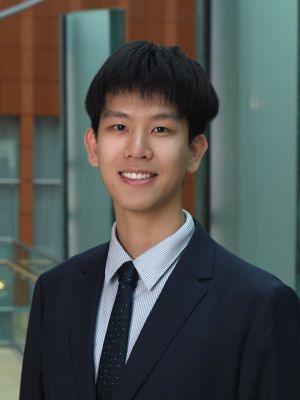 Andrew Chie
Andrew Chie
What is your post-grad career goal?
My post-graduation career goal is to further immerse myself in the supply chain management field by securing a position with a Chinese electric vehicle company. My aim is to optimize a company’s supply chain while focusing on green supply chain practices and new energy solutions. I am committed to promoting sustainability throughout my career to contribute to a better world.
Why did you decide to participate in the case competition?
I decided to participate in the case competition due to ISM’s esteemed reputation in the field of supply chain management. The topic of the competition particularly resonated with me, as it centered around the aerospace industry and included a focus on sustainability. Further, this specific competition will help in applying theoretical knowledge into practice, developing skills in problem-solving, and networking with other professionals and peers equally passionate about practices in relation to sustainability. This is a very good opportunity for me with respect to my career aspirations in green supply chain management.
Please tell us about your team's experience. What was most challenging for you, and how did you overcome it?
It was an enlightening and challenging experience for my team to participate in the case competition. From the beginning, we had created an organized strategy for ourselves, which featured a weekly plan to ensure that we executed our tasks within the planned time.
It provided research assignments to each of the group members and consultations with the librarians and advisors to help us understand the depth of the case even more and focus on the most challenging part of the case, including new knowledge and research about the virtual company. The challenge was further complicated by the fact that the company belonged to the aerospace industry. The case, therefore, had topics with which we were very unfamiliar: the aerospace material market, cybersecurity in the aerospace industry, and the sustainability of aerospace materials.
For these challenges, we approached a librarian who focused on aerospace, and he directed us to relevant sources and helped us with insights that were useful for grasping sophisticated topics. We also prepared several brainstorming meetings to share insights and integrate the research of each member into a group paper. We consulted with many faculty advisors to get their perspectives and enrich our decisions, including advisors with backgrounds in cybersecurity and sustainability to get more perspectives and improve our final recommendations.
How did Michigan Ross support or prepare you for the competition?
Michigan Ross supported us a great deal and prepared us for the competition. Among the most important is the support of the professors, especially Professor Ravi Anupindi. His professional insight and sound advice helped us polish our presentation and strategy, and his guidance helped us address intricate subjects in communicating findings and recommendations.
Ross also supported us with funding and logistical arrangements, enabling us to give all our attention to achieving excellence in the competition. The support from Michigan Ross was greatly appreciated by the members of our team and really added to the overall positive experience of the competition.
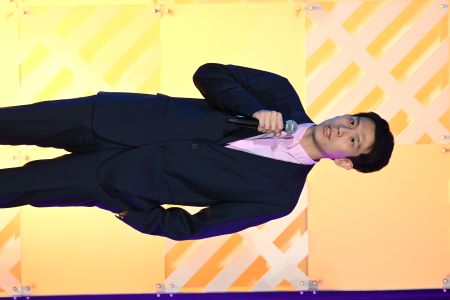 What did you learn from this experience?
What did you learn from this experience?
I dealt with the interface between cybersecurity and supply chain management and focused on vulnerabilities and ways to mitigate them. As the information age progresses, the security of the supply chain needs to play a critical role in a company’s success and brand standing.
Working together with colleagues, it was quite an experience learning how different perspectives and collaborative decision-making could result in solutions and outcomes that were innovative and had an impact. Many of the challenges we encountered were overcome through effective communication, task delegation, and mutual support. This event, organized by ISM, was very educational. Speeches and presentations from industry professionals opened one’s eyes to the latest trends and standards. Such sessions have changed my perception of the field and also boosted my professional connections with powerful people and inspired ideas.
Why should future MSCM students tackle this challenge?
It helps students apply theories learned in the classroom to this competitive and dynamic world. Students in the program learn the intricacies associated with supply chain management in a real-life scenario. It also enhances problem-solving and decision-making. The case studies that students tackle often require them to come up with solutions within short timeframes.
This not only increases students' power of analysis but prepares them for meeting high-pressure conditions in life. It also provides a very nice platform for networking. Students get a chance to interact with different industry professionals, faculty, and other students from diversified areas. Such interactions can generate possible mentorship deals, partnerships, and even job opportunities after graduation.
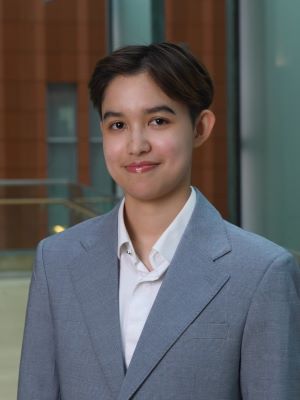 Panathip Chimrak
Panathip Chimrak
What is your post-grad career goal?
In the short term, I’ll be pursuing a PhD in environmental studies with a concentration in operations management at the University of Wisconsin-Madison. After finishing my doctoral degree, my goal is to become a professor in Thailand.
Why did you decide to participate in the case competition?
My interest revolves around sustainability, which was significantly highlighted in the business case. I initially wanted to learn more about sustainability in the aerospace industry. However, after delving deeper into the case, I realized how interconnected the issues of sustainability, cost, and cybersecurity are. This realization made the case even more interesting and challenging. Additionally, the way the case competition provided students with room for creativity to solve the case is what intrigued me and led to my decision to participate in this competition.
Please tell us about your team's experience. What was most challenging for you, and how did you overcome it?
The best thing about the team was that we had a great team dynamic, and each of us had different expertise. However, it also presented a challenge because we had a hard time reconciling our different points of view and putting together the information from each member. We tried to address the challenges by having weekly communication sessions to keep the team updated on each part, as well as seeking advice from professors to tie the stories together.
How did Michigan Ross support or prepare you for the competition?
What we have learned in class has already prepared us to a certain extent, as we always discussed different cases in class. In addition to the class material, we reached out to Professor Ravi Anupindi, Professor Joline Uichanco, and Professor Damian Beil to provide us with guidelines on how to solve the challenge in the most rational way. Not only have we received support from the faculty, but the One-Year Master’s Program team facilitated our trip to the conference. Without Michigan Ross, we would never have made it this far in the competition.
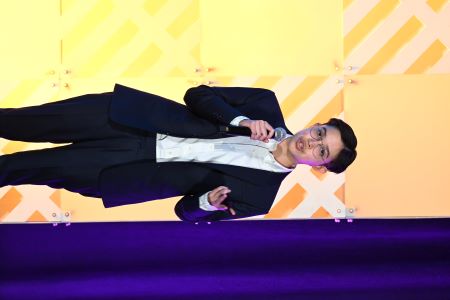 What did you learn from this experience?
What did you learn from this experience?
I have learned how to apply complicated concepts to real-life solutions. Even though the case requires many assumptions, there is common knowledge in the aerospace industry that we had to research intensively. Most importantly, I learned that team dynamics are the most important thing. It’s what kept me going and kept inspiring me to learn more.
Why should future MSCM students tackle this challenge?
They should take time to understand what the competition is looking for and what to emphasize when solving the case. We had put equal emphasis on each part of the questions, which is not necessarily what the competition values. Personally, I think the key to this competition lies in the rationality of your solution qualitatively and the quantitative forecasting for financial analysis. To future MSCM students, please feel free to contact me if you have any questions about the ISM competition.
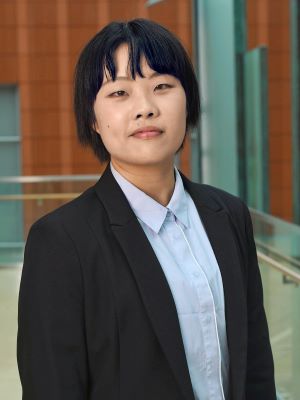 Michelle Lin
Michelle Lin
What is your post-grad career goal?
Since I've always been passionate about climate action, I want to contribute to and create a more equitable world by concentrating on promoting sustainability in the supply chain. For now, I would like to discover the opportunities hiding under each industry's supply chain and be creative in building strategies. As an international student, I'm also excited to see how solutions can be modified and immersed in different cultures and environments.
Why did you decide to participate in the case competition?
I was the one who gathered everyone to participate in this competition. Though I have participated in a variety of competitions in the past, this is, in fact, my first time participating in a case competition, and I was looking forward to implementing what we learned in class into reality. I didn't think much before registering; the only thing on my mind was to push myself outside my comfort zone and enjoy the competition.
Please tell us about your team's experience. What was most challenging for you, and how did you overcome it?
I truly had an awesome team, and everyone was willing to devote their time and energy to this extra event, even though there was also a lot going on around each of us, such as Consulting Studio projects. Our weekly meetings lasted for over three months without anyone being absent except on holidays. The case wasn't straightforward; it took us a long time to figure out the direction, even for starting the research. We really appreciate the help from librarian Dee to generate all the resources we need.
What I found most challenging was combining all our research results and devising strategies that connected all the tactics we suggested for the company in the case. The key that helped us overcome this was our teamwork. We simply sat down and listed out all our opinions regarding each aspect of the case. Given that we keep each other updated every week, we were able to brainstorm together without any further inefficient clarification.
How did Michigan Ross support or prepare you for the competition
Besides the help from the librarian, we also requested suggestions from Professor Ravi Anupindi and Professor Damian Beil to guide us. Also, without Ross supporting us with logistics and accommodations, we definitely wouldn’t have made it to the conference in person.
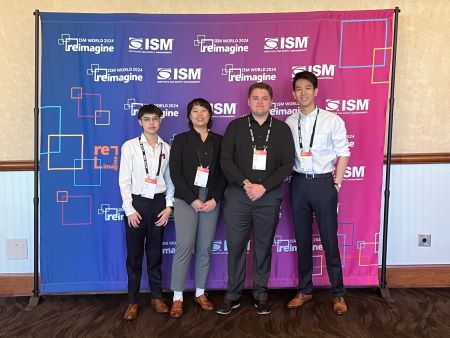 What did you learn from this experience?
What did you learn from this experience?
This year's topic was the aerospace industry, which I had no experience in before. Through this competition, I became more of an expert in this field after conducting a tremendous amount of research and have certainly grown interested in it.
The process of navigating the main problem of the case to settling on the strategies we were satisfied with requires lots of repeated debate and investigation. These were the points that I found myself really thinking through what I learned from class. Even things we learned the week before could be applied to the situation of this case. It's basically a loop in that we question every conclusion we make and dig into it more. Presenting to the professors was another crucial learning point. We learned they will always question more and discover our blind spot right away.
Why should future MSCM students tackle this challenge?
In this 10-month program, we will all go through an intense journey full of curriculum and connecting with new friends. This competition can be seen as a checkpoint where we can utilize our integrated individual experience and new knowledge. If lucky enough, attending the conference in person is definitely an unforgettable experience and will certainly broaden your perspective on the future of the supply chain. Most importantly, you will get a group of great teammates in your MSCM peers.
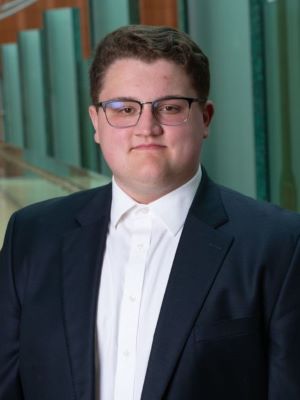 Scott Howard
Scott Howard
What is your post-grad career goal?
My post-grad career goal is to work for General Motors. I have a long family history with the company, and my educational experiences have all been with the goal of continuing my family legacy and becoming a fifth-generation GM employee. Beyond checking that box, I’d like to start my own business with a friend, and I plan on doing that simultaneously.
Why did you decide to participate in the case competition?
My friends were going to participate, and when they told me about it, it sounded like a fun challenge.
Please tell us about your team's experience. What was most challenging for you, and how did you overcome it?
Overall, the ISM Case Competition was a lot of work—almost another class load. Our biggest challenge was picking a direction to work toward and staying on track. To facilitate this, we had weekly meetings and check-ins to discuss progress and what needed to be done in the future.
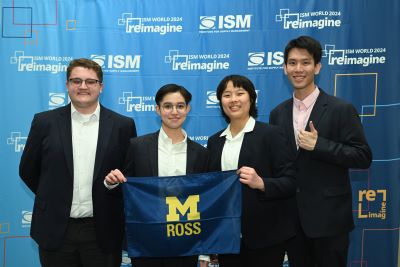 What did you learn from this experience?
What did you learn from this experience?
The main thing I learned was how to operate in an atmosphere of ambiguity. We didn’t have any specific direction to go on, yet we still had to pick one and get to it. Beyond that, I learned to have faith in my team and myself and how to operate in a conference environment with confidence and politeness. The amount of work we had to do was quite daunting, but the team stepped up, with all of us keeping each other on track. Once we got to Vegas, it was an experience unlike anything I’d been to before. Beyond the conference, maintaining discipline and focus on the job at hand within the extremely chaotic environment of Las Vegas is a skill that will continue to be useful long into the future.
Why should future MSCM students tackle this challenge?
Ambitious MSCM students should absolutely tackle this challenge to familiarize themselves with ambiguous projects in a safe environment. We were challenged during this project, and the sky was the limit with how much research we could have done on the subjects. Understanding when we were facing paralysis by analysis and other detractors was an invaluable experience and one I will be looking back on for a long time to come.







